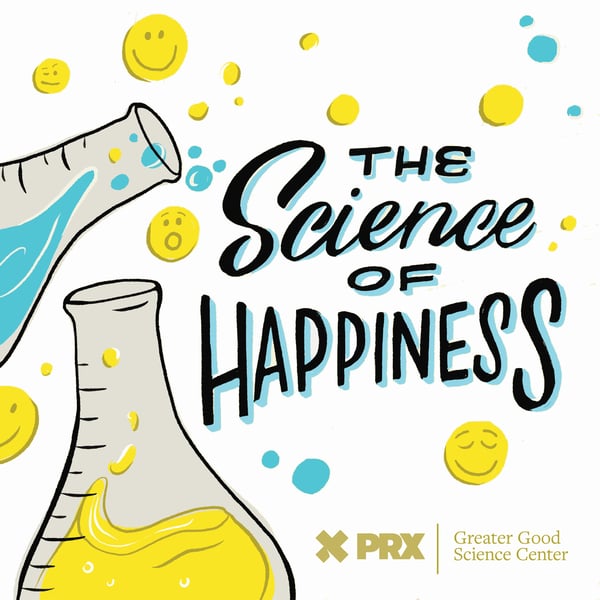How To Let In New Perspectives
The Science of Happiness
PRX and Greater Good Science Center
4.4 • 1.9K Ratings
🗓️ 15 August 2024
⏱️ 25 minutes
🧾️ Download transcript
Summary
With the U.S. election swiftly approaching, the political divide can feel overwhelming. But what happens when we recognize the limits of our knowledge?
Link to episode transcript: https://tinyurl.com/83a5wbkp
Episode Summary
When we internally acknowledge the limits of our knowledge, we create space to engage with other points of view. Allowing new perspectives in can help us better assess arguments, and decrease hubris. We will hear from psychologists Tania Israel and Daryl Van Tongeren about embracing opinions different from our own.
How To Do This Practice
Reflect on an issue you feel strongly about. Ask yourself the following questions when listening to someone’s opinion that differs from your own:
- How can other people help me to develop a broader or deeper understanding of this topic?
- Whose story isn't being told here?
- What's the perspective I'm not seeing?
- Check in with yourself as you're reading the news, are you just saying, “I agree with that perspective” or are there moments in which you can say, “This challenges me.”
This episode was supported by a grant from the John Templeton Foundation, as part of our project on “Expanding Awareness of the Science of Intellectual Humility.” To learn more, go to ggsc.berkeley.edu/ih.
Today’s guests:
Our guest host today is Allison Briscoe-Smith, a psychologist and Senior Fellow at The Greater Good Science Center.
Tania Israel is a psychology professor at UC Santa Barbara and author of the new book Facing the Fracture: How to Navigate the Challenges of Living in a Divided Nation.
Daryl Van Tongeren is a psychology professor at Hope College and author of the book Humble: Free Yourself from the Traps of a Narcissistic World.
- Learn more about Allison Briscoe-Smith: https://tinyurl.com/p3eexvkf
- Take BerkeleyX: Bridging Differences by Allison Briscoe-Smith: https://tinyurl.com/58z9vmvb
- Read Facing the Fracture: How to Navigate the Challenges of Living in a Divided Nation, by Tania Israel: https://tinyurl.com/yeyw7k6j
- Read Humble: Free Yourself from the Traps of a Narcissistic World, by Daryl Van Tongeren: https://www.darylvantongeren.com/books
Science of Happiness Episodes like this one:
A Way to Make Work More Meaningful: https://tinyurl.com/mtpay9jw
The Questions to Ask Yourself in an Argument: https://tinyurl.com/3uajhp4t
When It’s Hard to Connect, Try Being Curious: https://tinyurl.com/nhzj52vc
Making Difficult Interactions More Respectful: https://tinyurl.com/bddafcrw
Happiness Break Related Episodes:
A Meditation For Connecting In Polarized Times, With Scott Shigeoka: https://tinyurl.com/y6e4vdsd
Direct message us or leave a comment on Instagram @scienceofhappinesspod. You can also e-mail us at [email protected] or use the hashtag #happinesspod.
Help us share The Science of Happiness! Leave us a 5-star review on Apple Podcasts or share this link with someone who might like the show: https://tinyurl.com/2p9h5aap
Transcript
Click on a timestamp to play from that location
| 0:00.0 | Back in the 1990s, I had started a group to bring together pro-choice and pro-life people to have dialogue with each other. |
| 0:10.0 | And it was truly a transformational experience for me. |
| 0:14.0 | It didn't change anything about my views on abortion, |
| 0:18.0 | but it changed so much about my views of people who disagreed with me on the issue. |
| 0:24.0 | And so I knew that there were ways of connecting across the divide. |
| 0:28.0 | So I developed a skills building workshop |
| 0:30.0 | and I offered it to hundreds of people and you know they engaged in it and they learned a lot of things, you know, listening skills. |
| 0:38.5 | This is how you allow somebody's space to speak, this is how you reflect back what they've said, |
| 0:45.2 | this is how to ask an open-ended question. |
| 0:48.1 | But what I heard from people was there are people for whom dialogue was not the greatest challenge. |
| 0:56.0 | People who either didn't have anyone in their lives who were on another side, |
| 1:01.0 | they were in such an ironclad bubble or who said you know I don't |
| 1:05.1 | want to talk to those people and when I would delve into that you know like |
| 1:10.2 | what is it that keeps you from wanting to talk to them what I heard was a lot of their |
| 1:17.2 | cognitive biases about those other people about who they were about the kind of threat that they were. |
| 1:23.0 | So I started to realize the things other than or in addition to or proceeding dialogue that were needed. |
| 1:31.0 | No one's going to use any of these skills |
| 1:35.0 | if they aren't interested in where another person's coming from, |
| 1:39.0 | if they don't have that curiosity. |
| 1:45.0 | Welcome to the science of happiness. |
| 1:50.0 | I'm Allison Briscoe Smith, a psychologist and senior fellow at the Greater Good Science Center, |
| 1:55.0 | filling in for Dacker Keltner. |
... |
Please login to see the full transcript.
Disclaimer: The podcast and artwork embedded on this page are from PRX and Greater Good Science Center, and are the property of its owner and not affiliated with or endorsed by Tapesearch.
Generated transcripts are the property of PRX and Greater Good Science Center and are distributed freely under the Fair Use doctrine. Transcripts generated by Tapesearch are not guaranteed to be accurate.
Copyright © Tapesearch 2025.

